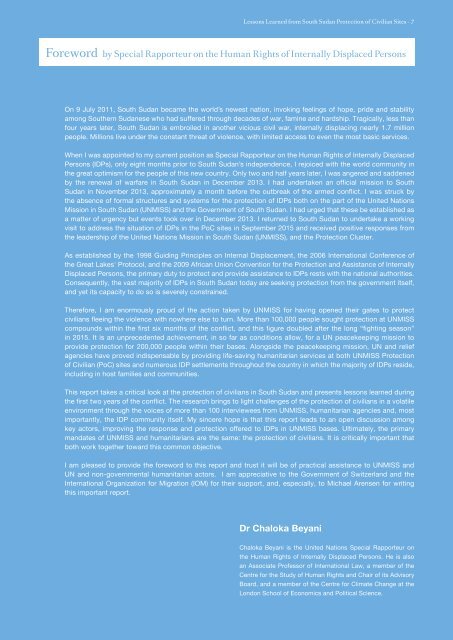Lessons Learned from South Sudan Protection of Civilian Sites 2013–2016
1rTWN7V
1rTWN7V
You also want an ePaper? Increase the reach of your titles
YUMPU automatically turns print PDFs into web optimized ePapers that Google loves.
<strong>Lessons</strong> <strong>Learned</strong> <strong>from</strong> <strong>South</strong> <strong>Sudan</strong> <strong>Protection</strong> <strong>of</strong> <strong>Civilian</strong> <strong>Sites</strong> - 7<br />
Foreword by Special Rapporteur on the Human Rights <strong>of</strong> Internally Displaced Persons<br />
On 9 July 2011, <strong>South</strong> <strong>Sudan</strong> became the world’s newest nation, invoking feelings <strong>of</strong> hope, pride and stability<br />
among <strong>South</strong>ern <strong>Sudan</strong>ese who had suffered through decades <strong>of</strong> war, famine and hardship. Tragically, less than<br />
four years later, <strong>South</strong> <strong>Sudan</strong> is embroiled in another vicious civil war, internally displacing nearly 1.7 million<br />
people. Millions live under the constant threat <strong>of</strong> violence, with limited access to even the most basic services.<br />
When I was appointed to my current position as Special Rapporteur on the Human Rights <strong>of</strong> Internally Displaced<br />
Persons (IDPs), only eight months prior to <strong>South</strong> <strong>Sudan</strong>’s independence, I rejoiced with the world community in<br />
the great optimism for the people <strong>of</strong> this new country. Only two and half years later, I was angered and saddened<br />
by the renewal <strong>of</strong> warfare in <strong>South</strong> <strong>Sudan</strong> in December 2013. I had undertaken an <strong>of</strong>ficial mission to <strong>South</strong><br />
<strong>Sudan</strong> in November 2013, approximately a month before the outbreak <strong>of</strong> the armed conflict. I was struck by<br />
the absence <strong>of</strong> formal structures and systems for the protection <strong>of</strong> IDPs both on the part <strong>of</strong> the United Nations<br />
Mission in <strong>South</strong> <strong>Sudan</strong> (UNMISS) and the Government <strong>of</strong> <strong>South</strong> <strong>Sudan</strong>. I had urged that these be established as<br />
a matter <strong>of</strong> urgency but events took over in December 2013. I returned to <strong>South</strong> <strong>Sudan</strong> to undertake a working<br />
visit to address the situation <strong>of</strong> IDPs in the PoC sites in September 2015 and received positive responses <strong>from</strong><br />
the leadership <strong>of</strong> the United Nations Mission in <strong>South</strong> <strong>Sudan</strong> (UNMISS), and the <strong>Protection</strong> Cluster.<br />
As established by the 1998 Guiding Principles on Internal Displacement, the 2006 International Conference <strong>of</strong><br />
the Great Lakes' Protocol, and the 2009 African Union Convention for the <strong>Protection</strong> and Assistance <strong>of</strong> Internally<br />
Displaced Persons, the primary duty to protect and provide assistance to IDPs rests with the national authorities.<br />
Consequently, the vast majority <strong>of</strong> IDPs in <strong>South</strong> <strong>Sudan</strong> today are seeking protection <strong>from</strong> the government itself,<br />
and yet its capacity to do so is severely constrained.<br />
Therefore, I am enormously proud <strong>of</strong> the action taken by UNMISS for having opened their gates to protect<br />
civilians fleeing the violence with nowhere else to turn. More than 100,000 people sought protection at UNMISS<br />
compounds within the first six months <strong>of</strong> the conflict, and this figure doubled after the long “fighting season”<br />
in 2015. It is an unprecedented achievement, in so far as conditions allow, for a UN peacekeeping mission to<br />
provide protection for 200,000 people within their bases. Alongside the peacekeeping mission, UN and relief<br />
agencies have proved indispensable by providing life-saving humanitarian services at both UNMISS <strong>Protection</strong><br />
<strong>of</strong> <strong>Civilian</strong> (PoC) sites and numerous IDP settlements throughout the country in which the majority <strong>of</strong> IDPs reside,<br />
including in host families and communities.<br />
This report takes a critical look at the protection <strong>of</strong> civilians in <strong>South</strong> <strong>Sudan</strong> and presents lessons learned during<br />
the first two years <strong>of</strong> the conflict. The research brings to light challenges <strong>of</strong> the protection <strong>of</strong> civilians in a volatile<br />
environment through the voices <strong>of</strong> more than 100 interviewees <strong>from</strong> UNMISS, humanitarian agencies and, most<br />
importantly, the IDP community itself. My sincere hope is that this report leads to an open discussion among<br />
key actors, improving the response and protection <strong>of</strong>fered to IDPs in UNMISS bases. Ultimately, the primary<br />
mandates <strong>of</strong> UNMISS and humanitarians are the same: the protection <strong>of</strong> civilians. It is critically important that<br />
both work together toward this common objective.<br />
I am pleased to provide the foreword to this report and trust it will be <strong>of</strong> practical assistance to UNMISS and<br />
UN and non-governmental humanitarian actors. I am appreciative to the Government <strong>of</strong> Switzerland and the<br />
International Organization for Migration (IOM) for their support, and, especially, to Michael Arensen for writing<br />
this important report.<br />
Dr Chaloka Beyani<br />
Chaloka Beyani is the United Nations Special Rapporteur on<br />
the Human Rights <strong>of</strong> Internally Displaced Persons. He is also<br />
an Associate Pr<strong>of</strong>essor <strong>of</strong> International Law, a member <strong>of</strong> the<br />
Centre for the Study <strong>of</strong> Human Rights and Chair <strong>of</strong> its Advisory<br />
Board, and a member <strong>of</strong> the Centre for Climate Change at the<br />
London School <strong>of</strong> Economics and Political Science.


